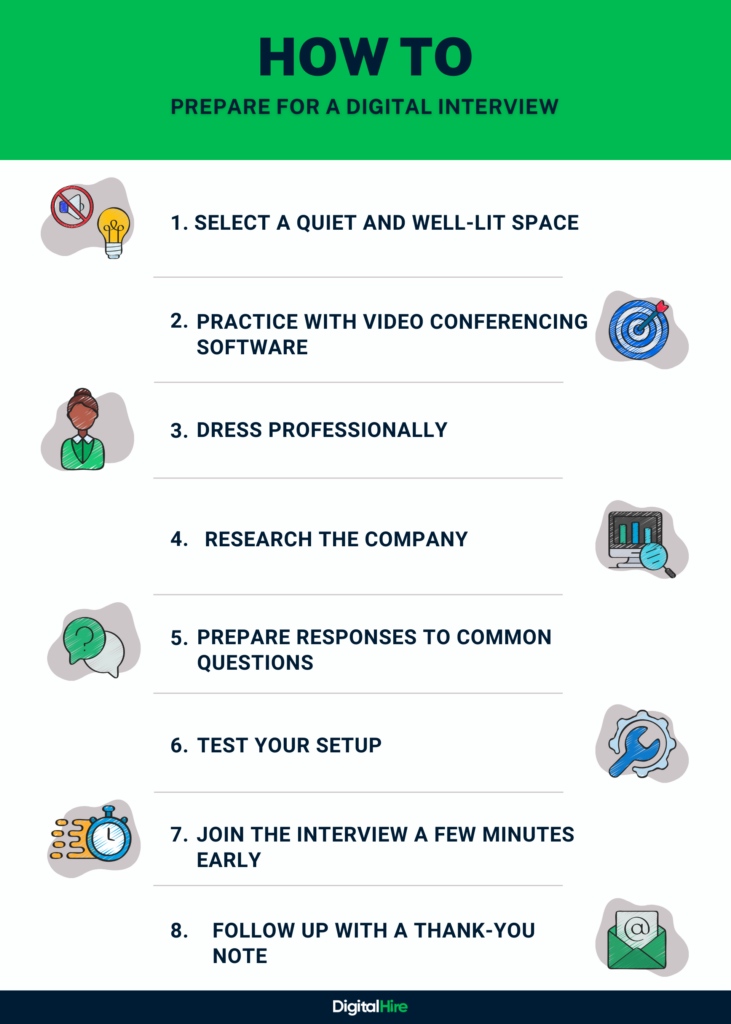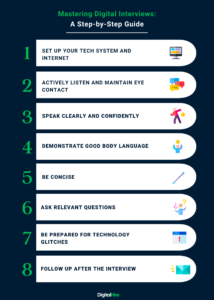Gone are the days of in-person meetings as companies increasingly turn to digital platforms to connect with potential candidates. In today’s fast-paced and technology-driven world, the way recruiters conduct interviews has evolved significantly and a digital interview is one of those ways.
Embracing digital interviews brings a unique set of challenges and opportunities. On one hand, it offers convenience, allowing you to interview from the comfort of your own home. On the other hand, it requires a new set of skills to effectively communicate and present yourself through a screen.
Navigating this shift can be daunting, but fear not! We are here to equip you with the knowledge and strategies needed to ace your next digital interview.

In this blog, we will dive into a treasure trove of tips, best practices, and expert advice that will help you shine in any virtual interview scenario. Let’s begin!
What Is a Digital Interview?
A digital interview, also known as a virtual or online interview, is a type of job interview conducted using digital communication tools and digital hiring platforms, such as Digital Hire, other video conferencing software, online assessment platforms, or pre-recorded video interviews.
Instead of meeting the interviewer in person, candidates and employers connect remotely through their computers or mobile devices. There are several types of digital interviews, let’s have a look.
-
Live Video Interviews
In this format, candidates and interviewers interact in real-time through video conferencing tools like Zoom, Skype, or Microsoft Teams. It replicates the face-to-face interview experience without the need for physical presence.
-
Pre-recorded Video Interviews
Employers send candidates a set of pre-recorded questions, and the candidates record their responses within a specified time frame. The employer can review these videos at their convenience.
-
Online Assessment Platforms
Some companies use specialized platforms for conducting online assessments, tests, or coding challenges to evaluate a candidate’s skills and aptitude.
How Are Digital Interviews Reshaping the Recruitment Landscape?
Digital interviews have been reshaping the recruitment landscape in several ways, including:
-
Increased Access
Digital interviews remove geographical barriers, enabling employers to connect with candidates from anywhere in the world. It opens up opportunities for candidates who may not have access to certain job markets due to location constraints.
-
Time and Cost Efficiency
With digital interviews, there’s no need for candidates and employers to travel, saving both time and money. It expedites the hiring process, allowing companies to reach decisions faster.
-
Diverse Talent Pool
By embracing digital interviews, organizations can tap into a more diverse talent pool, fostering inclusivity and diversity within their workforce.
-
Flexibility and Convenience
Digital interviews offer flexibility to both candidates and interviewers, as they can be scheduled to accommodate different time zones and busy schedules.
-
Enhanced Evaluation
Employers can assess a candidate’s adaptability to digital communication tools, which is increasingly important in remote work settings.
-
Environmentally Friendly
By reducing the need for travel, digital interviews contribute to a greener and more environmentally sustainable recruitment process.
As the world becomes increasingly interconnected, digital interviews and digital interview platforms are likely to become a staple in the recruitment process. Candidates who adapt and excel in this format will gain a competitive edge in today’s job market, while employers will have a more efficient and effective means of finding the best talent for their organizations.
Discover a Whole New Way to Interview. Say goodbye to mundane interviews and hello to an interactive job search experience. Don’t wait – join the waitlist for the first ever AI-powered Video Job Board!
10 Reasons Why Recruiters Are Choosing Digital Interview in 2024
In 2024, recruiters are increasingly opting for digital interviews due to the numerous advantages and advancements in technology. Here are ten compelling reasons why digital interviews have become a preferred choice.
-
Wider Talent Pool
Digital interviews transcend geographical boundaries, enabling recruiters to access talent from diverse locations. This global reach allows companies to find candidates with unique perspectives, experiences, and skill sets, fostering a more inclusive workforce that reflects the world’s diversity.
-
Time and Cost Savings
By eliminating the need for candidates and interviewers to travel, digital interviews significantly reduce expenses related to transportation, accommodation, and other logistical arrangements. Moreover, the time saved in scheduling and commuting allows recruiters to focus more on evaluating candidates and expediting the hiring process.
-
Faster Hiring Process
Digital interviews streamline candidate evaluation, offering recruiters immediate access to a broader pool of applicants. This accelerated assessment process allows companies to identify top talents swiftly, shortening the time it takes to fill crucial positions and gain a competitive edge in securing the best candidates.
-
Remote Work Trend
As remote work gains widespread acceptance, digital interviews reflect the modern work culture’s preferences. Companies that embrace this trend showcase their adaptability and commitment to supporting a flexible work environment, attracting candidates seeking work-life balance and remote work opportunities.
-
Advanced Assessment Tools
Innovative online assessment and video interview platforms provide recruiters with sophisticated tools for evaluating candidates’ skills, personality traits, and cultural alignment. These tailored evaluations enable recruiters to identify candidates who align best with the organization’s values and job requirements, resulting in more successful hires.
-
Video Interview Insights
Video interviews offer a holistic perspective of candidates beyond their resume. Observing non-verbal cues, facial expressions, and communication style helps recruiters assess interpersonal skills, confidence, and cultural fit more effectively, ultimately leading to better hiring decisions.
-
Enhanced Collaboration
Digital interview platforms enable real-time collaboration among hiring team members, facilitating seamless information sharing and feedback exchange. This enhanced teamwork improves the collective evaluation process, ensuring comprehensive candidate assessments and informed decisions.
-
Automated Screening
AI-powered screening tools analyze applications and resumes against predetermined criteria, efficiently identifying qualified candidates. Automating the initial screening process saves recruiters time and effort, enabling them to focus on engaging with the most promising candidates.
-
Sustainability
Opting for digital interviews aligns with environmental consciousness, as it significantly reduces the carbon footprint associated with traditional in-person interviews. The reduced need for travel not only benefits the planet but also demonstrates a company’s commitment to sustainable practices, appealing to environmentally conscious candidates.
-
Global Presence
Embracing digital interviews empowers multinational companies to connect with talent across the globe effortlessly. This expanded reach attracts diverse candidates with diverse backgrounds, languages, and perspectives, enriching the organization’s culture and enhancing its global footprint. Also, accommodating different time zones exemplifies a company’s commitment to a borderless and inclusive approach to hiring.
15 Winning Digital Interview Tips You Should Know
In the dynamic and fast-evolving world of job interviews, the landscape has undergone a significant transformation. The rise of digital interviews, fueled by technology and remote work trends, has become the new norm in talent acquisition.

In this comprehensive guide, we present 15 crucial digital interview tips to help candidates excel in 2024 and beyond.
-
Prepare Your Tech Setup: Ensuring a Smooth Virtual Experience
Before diving into the virtual interview, it’s imperative to prepare your tech setup. Test your computer’s functionality, webcam, and microphone to avoid any last-minute technical glitches. Ensure that your internet connection is stable to maintain clear communication throughout the interview. Consider having a backup device ready in case of unexpected technical issues. Being proactive in setting up your technology ensures a smooth and seamless interview experience.
-
Choose a Quiet and Well-lit Location: Setting the Right Environment
Select a quiet and well-lit location for your digital interview. Choose a space free from distractions and background noise to maintain focus and professionalism. A clutter-free background projects an organized image, and ample lighting ensures that the interviewer can see you clearly. Position yourself in front of a neutral background to avoid any visual distractions that may draw attention away from your responses.
-
Dress Professionally: Making a Positive First Impression
Just like in traditional in-person interviews, dressing professionally is crucial for digital interviews. Dress appropriately for the role you are applying for, and ensure your outfit reflects your respect for the opportunity. Looking professional demonstrates your commitment to the interview process and sets a positive tone for the conversation.
PJ bottoms are totally acceptable, just make sure your top half screams “I mean business!” 😉
-
Practice Body Language: Conveying Confidence and Engagement
Body language plays a significant role in how you are perceived during a digital interview. Sit up straight, make eye contact with the camera, and smile warmly to establish a connection with the interviewer. Avoid crossing your arms or displaying closed-off body language, as it can be interpreted as lack of confidence. Use natural hand gestures to emphasize points, but avoid excessive movement that may distract the interviewer.
-
Familiarize Yourself with the Platform: Ensuring Comfort and Confidence
Become familiar with the video conferencing platform or software being used for the interview. Practice using features like mute, screen sharing, and chat options to be confident in navigating the interface. Understanding the platform’s tools will help you focus on the conversation without worrying about technical challenges.
-
Minimize Distractions: Maintaining Focus
To avoid interruptions during your digital interview, inform others in your household about the scheduled time. Silence your phone and close unnecessary tabs on your computer to prevent pop-up notifications or sounds. Minimizing distractions allows you to focus entirely on the interview and present yourself in the best possible light.
-
Be Punctual: Showing Respect for the Interviewer’s Time
Being punctual for a digital interview is as crucial as it is for an in-person meeting. Join the interview a few minutes early to ensure everything is in order and to demonstrate your respect for the interviewer’s time. Avoid keeping the interviewer waiting, as it can create a negative first impression.
-
Research the Company: Demonstrating Interest and Preparedness
Thoroughly research the company before the interview. Understand its mission, values, culture, and recent developments. This knowledge will enable you to tailor your responses and showcase your genuine interest in the organization. Being well-informed also helps you ask thoughtful questions about the company during the interview.
-
Prepare Questions: Engaging in a Two-Way Conversation
Prepare a list of insightful questions to ask the interviewer at the end of the discussion. This demonstrates your engagement and enthusiasm for the role. Inquire about the company’s culture, team dynamics, opportunities for growth, or any recent projects to showcase your interest in becoming part of the organization.
-
Showcase Your Achievements: Highlighting Your Value
During the digital interview, take the opportunity to showcase your achievements and how they align with the job requirements. Use specific examples from your past experiences to demonstrate your skills, accomplishments, and contributions. Providing tangible evidence of your capabilities strengthens your candidacy and makes you stand out as a top candidate.
-
Speak Clearly and Concisely: Articulating Your Thoughts
Practice clear and concise communication before the digital interview. Avoid using jargon or technical language that might confuse the interviewer. Present your ideas and responses in a structured manner, ensuring your answers are easy to follow and understand.
-
Use the STAR Method: Structuring Your Responses
When answering behavioral questions, use the STAR method (Situation, Task, Action, Result) to structure your responses effectively. Start by describing the situation, explain the task at hand, outline the actions you took, and conclude with the positive results achieved. This structured approach helps you provide comprehensive answers that showcase your problem-solving and decision-making abilities.
-
Express Enthusiasm: Letting Your Passion Shine Through
Show enthusiasm for the role and the opportunity to join the company. Let your passion for the position and the organization shine through your tone and expressions. An enthusiastic candidate leaves a lasting impression on the interviewer and demonstrates a genuine interest in contributing to the company’s success.
-
Be Authentic: Being Yourself
Be authentic during the digital interview and let your personality come through naturally. Authenticity fosters a genuine connection with the interviewer and helps you build rapport. Avoid trying to be someone you’re not, as interviewers can often detect insincerity.
-
Follow up with a Thank-You Note: Leaving a Lasting Impression
After the digital interview, send a thank-you email to the interviewer within 24 hours. Express gratitude for the opportunity to interview and reiterate your interest in the position and the company. A well-crafted thank-you note demonstrates your professionalism, courtesy, and appreciation for the interviewer’s time.
Learning the skills of digital interviews is essential for candidates seeking success in the competitive job market of 2023. By following these 15 digital interview tips, candidates can impress recruiters, showcase their strengths, and stand out as the ideal choice for their dream positions.
As technology continues to shape the recruitment landscape, embracing digital interview best practices will undoubtedly set candidates on the path to professional triumph and career advancement.
Take charge of your job search with Digital Hire! Join the waitlist for our Video Resume Job Board.
How to Prepare for a Digital Interview
Your ultimate digital interview toolkit awaits! Follow our practical advice and conquer any virtual interview challenge like a pro!

How to Do a Digital Interview
Nail your digital interview like a champ! Below are a few tips to excel in virtual interviews and make a lasting impression

Digital Hiring Interview Questions
While digital hiring interview questions may vary depending on the role and company, here are some common questions you might encounter:
- Tell me about yourself and your professional background.
- What interests you about our company and this role?
- Describe a challenging situation you had at work and how you handled it?
- How do you prioritize your tasks when you have multiple deadlines?
- How do you handle working in a team? Can you give an example of a successful team collaboration?
- What are your strengths and weaknesses?
- What experience do you have with [specific tool or technology relevant to the role]?
- How do you stay updated with industry trends and advancements?
- What are your long-term career goals and how does this position fit into them?
- How do you plan to keep developing your skills and expertise in this field?
Prepare for these types of questions and tailor your responses to showcase your skills, experiences, and alignment with the company’s values and requirements.
Is a Digital Interview Worth the Hassle?
Digital interviews offer a range of benefits and challenges for both interviewers and candidates, making the evaluation of whether they are worth the hassle a nuanced consideration. Let’s examine the advantages and drawbacks from the perspectives of both parties:
For Interviewers
Advantages:
- Wider Talent Pool: Digital interviews break geographical barriers, enabling access to a more diverse talent pool from around the world. This expands the options for finding the best-fit candidates.
- Time and Cost Savings: Digital interviews eliminate the need for travel, saving both time and expenses associated with in-person meetings. It also significantly expedites the hiring process.
- Efficiency: Digital interviews streamline candidate evaluation, enabling faster decision-making and reducing time-to-fill vacant positions.
- Flexibility: Interviewers can conduct interviews from any location, making scheduling more convenient and accommodating different time zones.
- Reduced Bias: Through standardized questions and evaluation criteria, all candidates are assessed fairly and objectively. Additionally, remote interviews provide equal access to opportunities for candidates regardless of geographical location or mobility constraints.
- Advanced Assessment Tools: Digital platforms provide innovative assessment tools to evaluate candidates’ skills and cultural fit more accurately.
Drawbacks:
- Technology Challenges: Technical issues can disrupt the interview process, causing frustration for both interviewers and candidates.
- Limited Non-verbal Cues: Digital interviews may lack the full range of non-verbal cues, potentially making it harder to gauge candidates’ personalities.
- Connection Issues: Unstable internet connections can lead to communication problems and hinder the flow of the interview.
For Candidates
Advantages
- Convenience: Candidates can interview from the comfort of their own homes, reducing the stress and cost associated with travel.
- Global Reach: Digital interviews provide access to opportunities beyond local job markets, enabling candidates to explore positions worldwide.
- Time and Cost Savings: Candidates save time and money by avoiding travel expenses and time-consuming commutes.
- Remote Work: Embracing digital interviews aligns with the remote work trend, appealing to candidates seeking flexible work arrangements.
Drawbacks
- Technical Challenges: Candidates must ensure their tech setup is in order and may encounter technical issues during the interview.
- Impersonal: Digital interviews can feel less personal compared to face-to-face interactions, potentially impacting the candidate’s rapport with the interviewer.
- Interview Environment: Candidates must find a suitable and distraction-free environment for the interview.
The worth of digital interviews for both interviewers and candidates depends on the specific circumstances and preferences. Striking a balance between the convenience of digital interviews and the value of in-person interactions is key.
Depending on the role, company culture, and the nature of the position, interviewers and candidates should weigh the advantages and disadvantages to decide whether digital interviews are worth the hassle or if a hybrid approach that incorporates both digital and in-person elements would be more suitable.
Frequently Asked Questions
-
How do I prepare for a digital interview?
To prepare for a digital interview, ensure your tech setup is reliable and familiarize yourself with the video conferencing platform. Choose a quiet, well-lit location with a clutter-free background. Dress professionally and practice using good body language. Research the company, prepare answers to common interview questions, and have thoughtful questions to ask the interviewer. Conduct mock interviews with a friend or family member to practice your responses and get feedback. Being well-prepared boosts confidence and helps you present your best self during the digital interview.
-
What to expect in a digital interview?
In a digital interview, expect to interact with the interviewer through video conferencing software. The interviewer may ask behavioral, situational, or technical questions related to the role. Be ready for pre-recorded or live digital interviews. Pay attention to your body language and facial expressions, as they play a significant role in the virtual setting. Expect the interviewer to assess your communication skills, problem-solving abilities, and cultural fit. Be prepared for potential technology hiccups, but remain calm and adaptable.
-
How do you introduce yourself in a digital interview?
In a digital interview, start with a confident and concise self-introduction. Begin by stating your name and briefly mentioning your current role and background. Highlight your relevant experience and skills that align with the position. Share your enthusiasm for the opportunity and briefly express why you are interested in the company. Maintain eye contact with the camera and smile warmly to create a positive first impression.
-
How do I pass an online interview successfully?
To succeed in an online interview, preparation is key. Practice your responses to common interview questions and demonstrate enthusiasm for the role. Pay attention to your body language and maintain good eye contact with the camera. Showcase your achievements and provide specific examples to back your claims. Research the company and ask thoughtful questions at the end. Be punctual and adapt to potential technical challenges with grace.
Let DigitalHire find your next job! Join us as a beta user for the first-ever AI-powered Video Job Board. Join the waitlist!
Final Verdict
Digital interviews offer numerous advantages, including a wider talent pool, cost and time savings, and enhanced efficiency in the hiring process. However, candidates must also be mindful of potential challenges, such as technical issues and the need to adapt to a more impersonal setting.
By diligently preparing for digital interviews, candidates can confidently navigate the virtual landscape and present their best selves to potential employers.
As technology continues to shape the recruitment landscape, digital interviews are likely to remain a prominent component of the hiring process. By staying adaptable and leveraging the benefits of digital interviews, candidates can position themselves as competitive and advanced in the fast-paced and interconnected world of job opportunities.
 Offer
Offer


